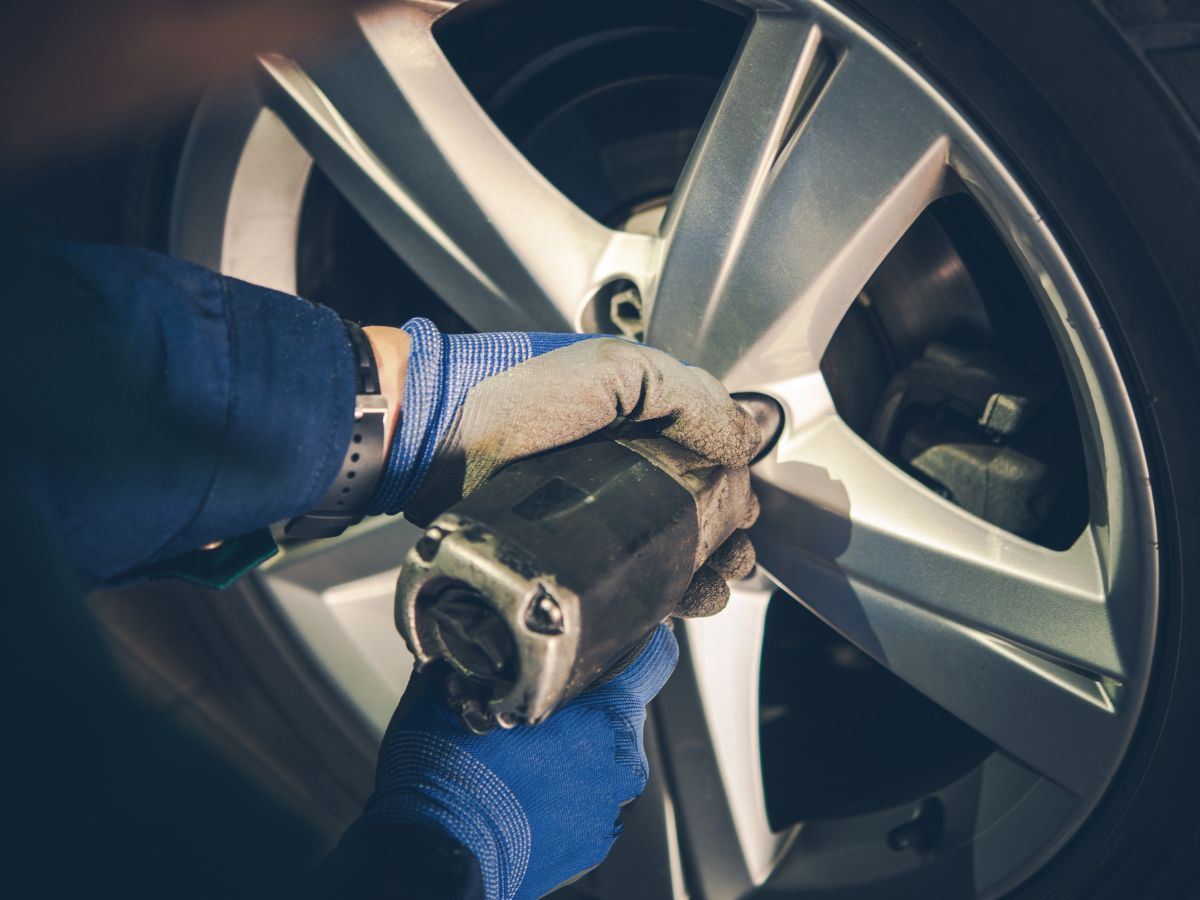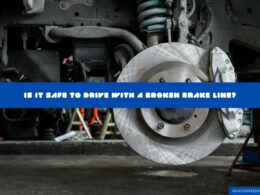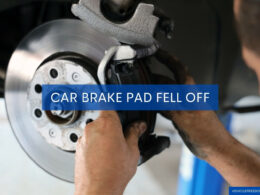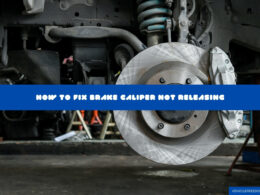In This Article Show
Today, we tackle an issue commonly reported but often misunderstood – when your car jerks when braking.
If you’ve ever been in a situation where your vehicle jerks or shudders as you apply the brakes, you know how unsettling it can be. As an experienced mechanic, I’ve encountered this issue countless times, and I can assure you it’s more common than you might think.
But what causes this jerky motion when braking? Is it a telltale sign of a bigger issue waiting to wreak havoc on your vehicle? Or is it something that you can fix yourself with a few tools and a little know-how? These are the questions we will answer in this blog post.
Having a deep understanding of your car’s braking system, its potential issues, and how to fix them, is not just an optional skill for car enthusiasts but a necessity for every car owner. Why? Because when it comes to your safety and the safety of others on the road, there’s no room for guesswork. Let’s dig in.
Top Causes of Car Jerks When Braking
You understand the main culprits behind your car jerking when braking can help you diagnose the problem more accurately. Here, we will break down some of the top reasons why this may happen.
1. Worn Out Brake Rotors
Brake rotors, or discs, are what your brake pads clamp down on to stop the wheels and, consequently, your car. Over time, these rotors can wear down or warp due to the intense heat generated by braking. Uneven brake rotors can lead to an uneven application of the brakes, causing your car to jerk when you brake.

2. Contaminated Brake Fluid
The brake fluid plays an essential role in your car’s braking system. It transfers the force you apply on the brake pedal to the brake rotors. If the fluid gets contaminated, perhaps by water or dirt, it can cause inconsistent brake pressure, leading to a jerking motion when braking.
3. Damaged Brake Pads
Brake pads wear out over time. When they become too thin, they might not be able to create enough friction to stop the car smoothly, leading to a jerking motion. Additionally, if the brake pads are unevenly worn, they can grab the rotors inconsistently and cause the car to jerk when braking.
4. Malfunctioning Braking System Sensors
Modern cars are equipped with numerous sensors to monitor and control the car’s behavior. If a sensor related to the braking system malfunctions, it could lead to irregularities in brake force distribution, causing your car to jerk when you apply the brakes.
5. Issues with the Car’s Transmission System
Though not directly related to the braking system, issues with your car’s transmission system can also cause your car to jerk when braking. If your car’s transmission system isn’t smoothly downshifting as you slow down, it could cause the car to jerk.
6. Engine-Related Problems
Similarly, engine problems can sometimes manifest as a jerk when braking. For instance, if there’s a misfire in one or more of your engine’s cylinders, it might cause your car to jerk when you apply the brakes.
7. Tire-Related Issues
Last but not least, the condition of your tires can also contribute to your car jerking when braking. If your tires are unevenly worn, it can cause an imbalance in your car that becomes noticeable when you apply the brakes.
Remember, these are just potential causes. The exact cause of your car’s jerking motion when braking might be one or a combination of these.

Identifying Signs of Braking Issues
A smooth driving experience is something we all strive for, but sudden jerking when braking can instantly disrupt this calm. It’s essential to recognize the signs of braking issues, as timely diagnosis can save you from more significant problems down the road. Here’s what to watch out for:
1. Changes in Brake Pedal Resistance
If your brake pedal feels unusually soft or hard, it could indicate a problem in your braking system. For instance, a soft pedal could mean the air in the brake lines or a problem with the master cylinder, while a hard pedal could suggest issues with the brake booster.
2. Car Pulling to One Side When Braking
If your car tends to veer to one side when you apply the brakes, it could mean the brake linings are wearing unevenly or there could be foreign matter in the brake fluid. Your vehicle’s alignment could also be off, or your tires might be unevenly worn.
3. Squeaking or Squealing Noises
High-pitched squeaking or squealing noises when braking usually indicate that the brake pads are worn out and need replacing. In some cases, it could also suggest that your rotors are worn beyond their limit.
4. Vibrations or Pulsations
Feeling vibrations or pulsations in your brake pedal could indicate warped rotors. Warping can happen due to severe braking, which generates a lot of heat leading to an uneven surface on the rotor.
5. Warning Lights
Modern vehicles come equipped with warning lights that illuminate when there’s a problem with the braking system. If you notice the brake warning light or the ABS (Antilock Braking System) light on your dashboard, it’s a clear sign that something’s not right.

6. Reduced Brake Performance
If you find your car takes longer to stop or the brakes aren’t as responsive as they used to be, it might indicate a problem with the braking system. This could be due to worn-out brake pads, contaminated brake fluid, or more severe issues.
Fixing the Jerking Issue: Step-by-Step Guide
Resolving the problem of your car jerking when braking involves diagnosing the cause accurately and applying the right fix. Here’s a step-by-step guide to tackling each potential issue:
1. Worn Out Brake Rotors
If your brake rotors are worn out or warped, they must be replaced. A professional mechanic usually performs this task, but if you’re comfortable with auto maintenance, you can do it yourself. You’ll need new rotors, a basic tool kit, and a jack to lift your car.
2. Contaminated Brake Fluid
Contaminated brake fluid should be replaced with new, clean fluid. This process, known as bleeding the brakes, involves removing the old fluid and any air in the brake lines, and then adding new fluid. You can do this at home with the right tools and a helper or take your car to a mechanic.
3. Damaged Brake Pads
If your brake pads are damaged or worn out, you must replace them. This involves removing the wheel, the caliper, and then the old brake pad, and installing the new one. Remember to apply a brake lubricant to the back of the new brake pads to prevent squeaking.
4. Malfunctioning Braking System Sensors
Malfunctioning sensors need to be replaced. It’s generally recommended to have this done by a professional, as the diagnosis and replacement process can be complex and requires specific tools.
5. Issues with the Car’s Transmission System
Transmission issues can be complex and require a professional mechanic. They might need to adjust the transmission, replace parts, or even replace the whole transmission system.
6. Engine-Related Problems
Engine problems can manifest in many ways and require a professional for accurate diagnosis. Depending on the specific issue, fixes might involve replacing spark plugs, adjusting the fuel intake, or other more complex repairs.
7. Tire-Related Issues
Finally, if your tires are causing the issue, you might need to replace them or have them rotated and balanced. Ensure that your tires are always properly inflated, and replace them as soon as they’re worn out.
If you’re unsure or uncomfortable with performing these fixes yourself, it’s best to take your car to a professional. A professional mechanic can accurately diagnose and fix the problem, ensuring your safety on the road.
Preventive Measures to Avoid Car Jerking
Avoiding car jerks when braking is primarily about preventive maintenance. As a seasoned mechanic with over 13 years of experience in the industry, I’ve seen the difference regular maintenance can make. Here are some preventive measures you can take:
1. Regular Maintenance and Inspections
Regularly servicing your car is key to keeping it in good shape. Make sure to have your brake system inspected at least once a year. This helps catch issues like worn-out brake pads, contaminated brake fluid, or worn-out rotors before they lead to a jerking problem.
2. Use High-Quality Brake Pads and Brake Fluids
Using high-quality brake pads and brake fluids can significantly enhance your braking system’s longevity and performance. While they may cost a bit more upfront, they pay for themselves in the long run by reducing the frequency of replacements and potential issues.
3. Proper Driving Techniques
Your driving techniques can significantly affect the life of your brake system. Avoid abrupt stops as much as possible. Instead, try to slow down gradually. This helps reduce the strain on your braking system and prevents the premature wearing out of the brake pads and rotors.
4. Regular Tire Checks
Ensure your tires are always in good condition. Check their pressure regularly and keep them properly inflated. Regularly rotate your tires and have them balanced to ensure even wear. Worn-out tires should be replaced promptly.
5. Monitor Your Car’s Performance
Always be aware of how your car performs. If you notice any changes, like increased stopping distance or any unusual sounds, don’t ignore them. Early diagnosis can save you from bigger problems down the line.
When to Consult a Professional Mechanic
While some car issues can be fixed at home with the right tools and a bit of elbow grease, others require the expertise of a professional. Here are some situations where you should consider consulting a professional mechanic:
1. Unclear Diagnosis
If you’ve noticed your car jerking when braking but can’t quite figure out why, it’s time to consult a professional. A mechanic can use advanced tools and knowledge to diagnose the issue accurately.
2. Repetitive Problems
If a particular problem keeps occurring despite your attempts to fix it, it might be an indication of a deeper issue that’s not immediately obvious. In this case, getting a professional mechanic to investigate is advisable.
3. Complex Repairs
Some repairs, like dealing with the braking system sensors, transmission system, or engine-related problems, can be complex and require special tools. Unless you’re experienced and confident in tackling these, entrusting them to a professional is safer.
4. Lack of Time or Tools
Sometimes, even if you’re capable of repairing, you might not have the necessary tools or the time. Mechanics can access specialized tools that make the job quicker and easier, saving time and effort.
5. Safety Concerns
Safety should always be your top priority. If you’re not confident in your ability to perform a repair safely, it’s best to take your car to a mechanic. Braking issues, in particular, can be safety-critical and must be addressed correctly.
Wrapping it up
In conclusion, experiencing your car jerking when braking can be concerning, but understanding the potential causes and solutions is the first step in addressing the issue.
Remember, regular maintenance and inspections can help prevent these problems from occurring in the first place.
However, if the problem persists or if you’re unsure about the cause, it’s always best to consult a professional mechanic.















